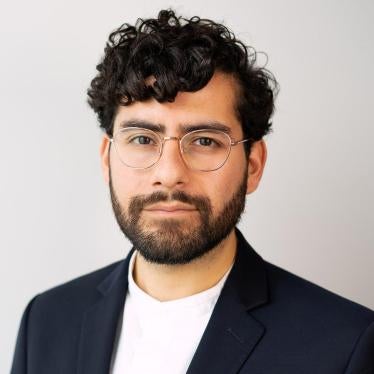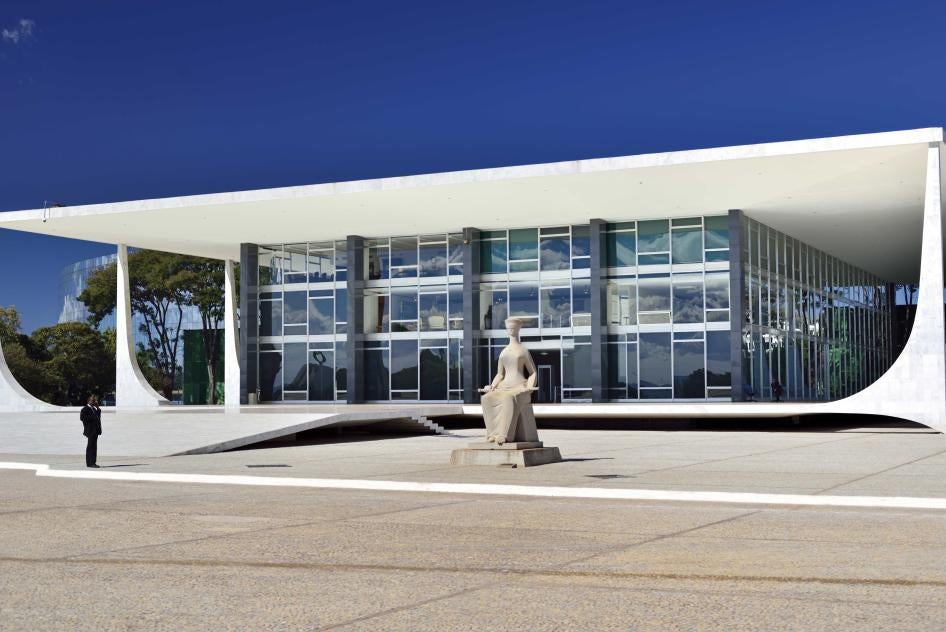Amid the public health crisis in the country, Brazil has recently achieved two significant victories for the right to education and the rights of women and lesbian, gay, bisexual, and transgender (LGBT) people. On April 24, the Supreme Court unanimously struck down a 2015 law from Novo Gama, Goias state that banned learning materials with information on “gender ideology” in municipal schools. On May 8, the court struck down a similar part of a 2018 law from Foz do Iguaçu, Paraná state, prohibiting educational policies and school activities “likely to apply ‘gender ideology’ or the terms ‘gender’ or ‘sexual orientation.’”
“Gender ideology” is a vacuous catch-all term generally intended to denote an ill-defined gay and feminist conspiracy to wreak havoc on traditional values. In Brazil, far-right movements and politicians have peddled disinformation to popularize the term. In the case of the Foz do Iguaçu law, the legislature also seems to have wanted to eliminate education about the realities of women and LGBT people by banning words used to describe their experiences.
Brazil’s former attorney general, Raquel Dodge, challenged the Novo Gama law as constitutionally deficient. The Communist Party of Brazil did the same for the Foz do Iguaçu law. In both cases, the Supreme Court agreed unanimously that the laws violated “procedural and substantive” constitutional principles and provisions.
The court ruled that municipalities cannot override national education plans and also found that the municipal bans violated the rights to equality, education, and freedom of expression. In the Novo Gama case, the ruling written by Justice Alexandre de Moraes and supported by the full court said that the law “imposed silence, censorship, and more broadly, obscurantism.” In the Foz do Iguaçu case, Justice Cármen Lúcia’s ruling held that “the suppression of curricular content is a serious measure that directly affects the daily lives of students and teachers… [and harms] an indispensable part of their right to learn.”
In effect, the court’s rejection of the amorphous bans on “gender ideology” upholds children’s right to comprehensive sexuality education – their right to age-appropriate learning material that can help foster safe and informed practices to prevent gender-based violence, gender inequality, sexually transmitted infections, and unintended pregnancies.
The Supreme Court’s decisions also uphold the right to non-discrimination by holding that the municipal legislatures neglected their duty to promote politics of inclusion and equality, which can prevent prejudice and violence against LGBT people. While the court based its arguments on Brazil’s constitution, its ruling is in line with international human rights standards relating to the rights to information, education, health, and non-discrimination.
The court’s decisions reverberate beyond Brazil’s borders. “Gender ideology” rhetoric spans the globe, first propagated by the Vatican and since sustained by opportunistic politicians and ideologues who seek to limit women’s, adolescents’, and LGBT people’s rights.
In Colombia, some political leaders and evangelical churches used such rhetoric to attack the landmark 2016 peace accord between the government and the Revolutionary Armed Forces of Colombia (FARC), which includes provisions addressing the historical exclusion of women and LGBT people in the country. In Costa Rica, “gender ideology” claims shaped the 2018 presidential race when a right-wing evangelical candidate employed the term to make same-sex marriage a key issue in the election. In Europe, political crusades against “gender ideology” have been used to galvanize support for measures that restrict access to abortion and comprehensive sexuality education in Poland and legal gender recognition for transgender people in Hungary.
Other nations should take note of the Brazilian Supreme Court’s unequivocal rebukes of the municipal laws, which show how independent democratic institutions can respond to disinformation and protect fundamental rights.
Regrettably, the laws from Novo Gama and Foz do Iguaçu are not anomalies in Brazil. In response to the Supreme Court’s recent jurisprudence, President Jair Bolsonaro has vowed to send to the National Congress a federal bill with similar content. Hundreds of bills are pending or have been approved in municipal and state legislatures and in Congress that aim to limit “gender ideology” or “indoctrination.” These would restrict the right to comprehensive sexuality education and promote intolerance. About 15 petitions are before the Supreme Court to challenge such laws. The Supreme Court’s latest rulings are sending a clear and powerful message that all Brazilian policymakers should heed.










